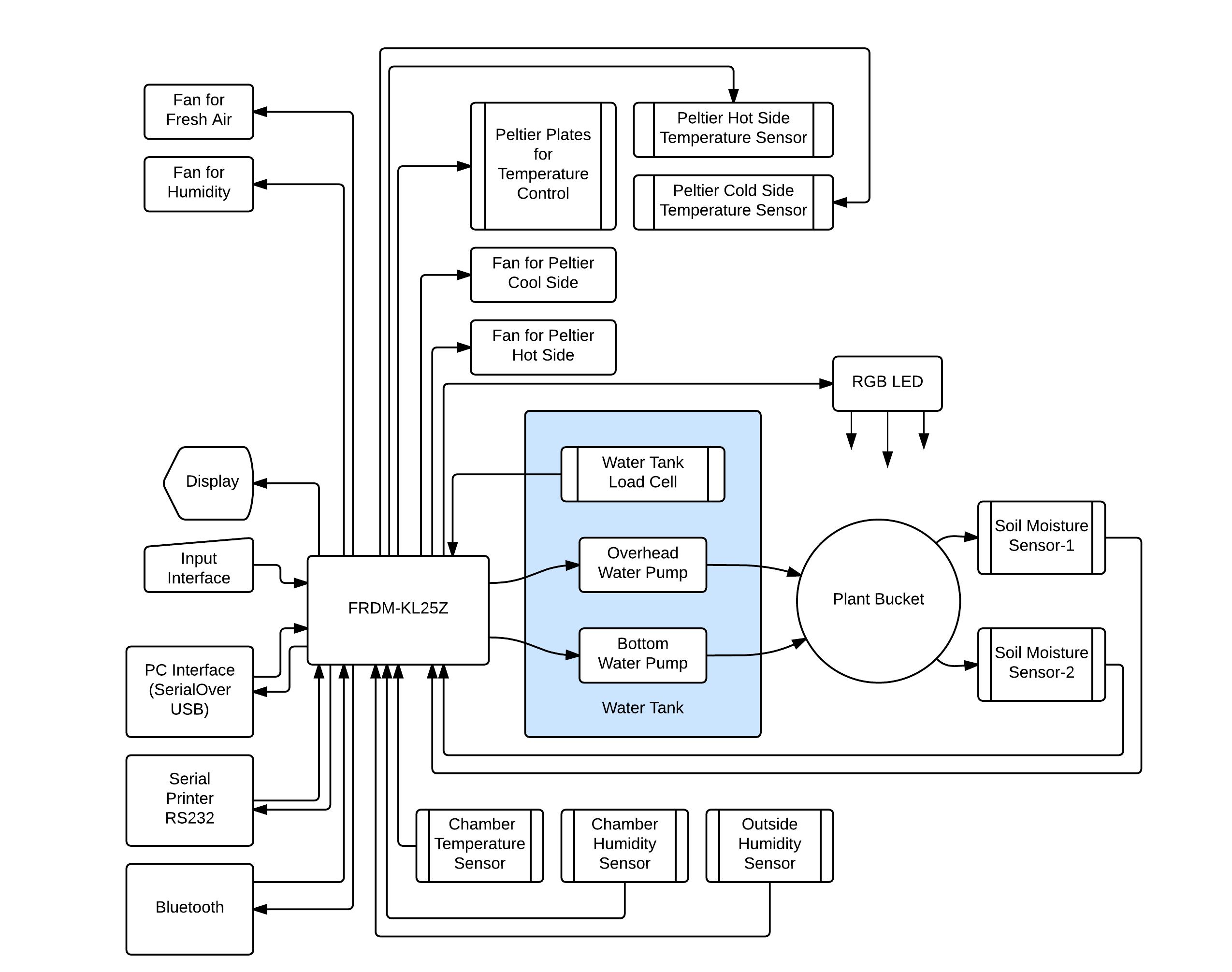Project Autus - Automated Plant Chamber
Fork of keypad_test by
Autus
This is the codebase accompanying the project Autus.
Autus is an automated growth chamber for plants.
Features
Control Humidity inside chamber wrt to external humidity.
Control Temperature inside chamber. ( Peltier Heaters/Coolers )
Water and shower plants.
Control soil humidity.
Monitor water tanks level (Load Cell)

Code Base Features
Fixed timing and CRC for DHT-11 Sensor. Fixed OneWire bug for ds18b20
Cyclic Executive Scheduler with Priority. Async IPC framework for PC App over bluetooth
Fake RTC systick, I was having some trouble with the on board rtc.

DS18B20Multiple/OneWireThermometer.cpp
- Committer:
- umairaftab
- Date:
- 2014-04-14
- Revision:
- 57:7ab93ed49b70
- Parent:
- 38:9f4107db1bff
File content as of revision 57:7ab93ed49b70:
/*
* OneWireThermometer. Base class for Maxim One-Wire Thermometers.
* Uses the OneWireCRC library.
*
* Copyright (C) <2010> Petras Saduikis <petras@petras.co.uk>
*
* This file is part of OneWireThermometer.
*
* OneWireThermometer is free software: you can redistribute it and/or modify
* it under the terms of the GNU General Public License as published by
* the Free Software Foundation, either version 3 of the License, or
* (at your option) any later version.
*
* OneWireThermometer is distributed in the hope that it will be useful,
* but WITHOUT ANY WARRANTY; without even the implied warranty of
* MERCHANTABILITY or FITNESS FOR A PARTICULAR PURPOSE. See the
* GNU General Public License for more details.
*
* You should have received a copy of the GNU General Public License
* along with OneWireThermometer. If not, see <http://www.gnu.org/licenses/>.
*/
#include "OneWireThermometer.h"
#include "OneWireDefs.h"
//#include "DebugTrace.h"
//DebugTrace pc(OFF, TO_SERIAL);
// constructor specifies standard speed for the 1-Wire comms
// Used to have params for CRCon and useAddress, can't see why you wouldn't use CRC and you have to use address since there could be more than one.
OneWireThermometer::OneWireThermometer(PinName pin, int device_id) :
oneWire(pin, STANDARD), deviceId(device_id), resolution(twelveBit)
{
// NOTE: the power-up resolution of a DS18B20 is 12 bits. The DS18S20's resolution is always
// 9 bits + enhancement, but we treat the DS18S20 as fixed to 12 bits for calculating the
// conversion time Tconv.
deviceCount = 0;
}
bool OneWireThermometer::initialize()
{
// get all the device addresses for use in selectROM() when reading the temperature
// pc.traceOut("\r\n");
//pc.traceOut("New Scan\r\n");
oneWire.resetSearch();
while (oneWire.search(address)) // search for 1-wire device address
{
//pc.traceOut("Address = ");
for (int i = 0; i < ADDRESS_SIZE; i++)
{
//pc.traceOut("%x ", (int)address[i]);
devices[deviceCount][i] = address[i];
}
//pc.traceOut("\r\n");
deviceCount++;
}
if (OneWireCRC::crc8(address, ADDRESS_CRC_BYTE) != address[ADDRESS_CRC_BYTE]) // check address CRC is valid
{
//pc.traceOut("CRC is not valid!\r\n");
wait(2);
return false;
}
if (address[0] != deviceId)
{
// Make sure it is a one-wire thermometer device
if (DS18B20_ID == deviceId){}
//pc.traceOut("You need to use a DS1820 or DS18S20 for correct results.\r\n");
else if (DS18S20_ID == deviceId){}
//pc.traceOut("You need to use a DS18B20 for correct results.\r\n");
else{}
// pc.traceOut("Device is not a DS18B20/DS1820/DS18S20 device.\r\n");
wait(2);
return false;
}
else
{
if (DS18B20_ID == deviceId){} //pc.traceOut("DS18B20 present and correct.\r\n");
if (DS18S20_ID == deviceId){} //pc.traceOut("DS1820/DS18S20 present and correct.\r\n");
}
return true;
}
// NOTE ON USING SKIP ROM: ok to use before a Convert command to get all
// devices on the bus to do simultaneous temperature conversions. BUT can
// only use before a Read Scratchpad command if there is only one device on the
// bus. For purpose of this library it is assumed there is only one device
// on the bus.
void OneWireThermometer::resetAndAddress()
{
oneWire.reset(); // reset device
oneWire.matchROM(address); // select which device to talk to
}
bool OneWireThermometer::readAndValidateData(BYTE* data)
{
bool dataOk = true;
resetAndAddress();
oneWire.writeByte(READSCRATCH); // read Scratchpad
// pc.traceOut("read = ");
for (int i = 0; i < THERMOM_SCRATCHPAD_SIZE; i++)
{
// we need all bytes which includes CRC check byte
data[i] = oneWire.readByte();
// pc.traceOut("%x ", (int)data[i]);
}
//pc.traceOut("\r\n");
// Check CRC is valid
if (!(OneWireCRC::crc8(data, THERMOM_CRC_BYTE) == data[THERMOM_CRC_BYTE]))
{
// CRC failed
// pc.traceOut("CRC FAILED... \r\n");
dataOk = false;
}
return dataOk;
}
float OneWireThermometer::readTemperature(int device)
{
BYTE data[THERMOM_SCRATCHPAD_SIZE];
float realTemp = -999;
// need to select which device here.
for (int i = 0; i < ADDRESS_SIZE; i++)
{
address[i] = devices[device][i];
}
resetAndAddress();
oneWire.writeByte(CONVERT); // issue Convert command
// Removed the check for parasitic power, since we waited the same time anyway.
wait_ms(CONVERSION_TIME[resolution]);
if (readAndValidateData(data)) // issue Read Scratchpad commmand and get data
{
realTemp = calculateTemperature(data);
}
return realTemp;
}
int OneWireThermometer::getDeviceCount()
{
return deviceCount;
}
 Umair Aftab
Umair Aftab
